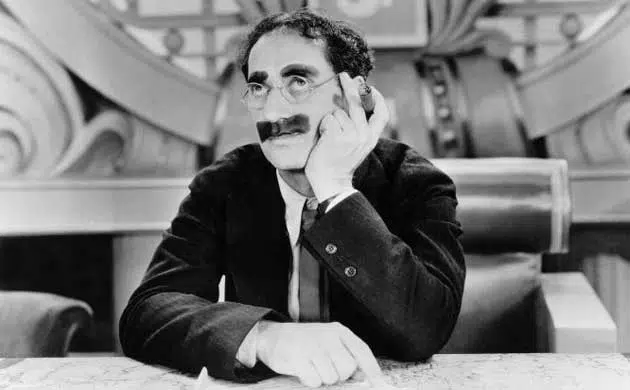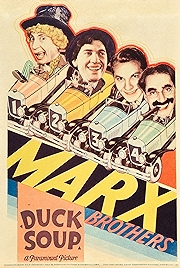A movie for every day of the year – a good one
2 October
Groucho Mark born, 1890
On this day in 1890, Julius Henry Marx, one of the 20th century’s most distinctive comedians was born, in New York City. He started off in a vaudeville singing troupe with various members of the family, including his mother at one point. When pure singing didn’t work for them, the Marx brothers started to include comedy in their act, losing non family members on the way and eventually settling down to be the four brothers, Julius, Adolph, Leonard and Milton (aka Groucho, Harpo, Chico and Gummo). Gummo decided to leave and Zeppo, considered the funniest offstage, joined the gang. At one point a large part of the Marx brothers act consisted of each adopting a different ethnic accent, to comic effect. Julius’s chosen accent was German. When the First World War broke out, anti-German sentiment persuaded him to alter his shtick. Out went the German, in came the wise-cracking shyster he was forever after associated with (for the same reason his brother, Adolph, changed his name to Arthur, which was to serve him even better through the next World War). Groucho made 13 films with his brothers, and he was always the star – the creative force offstage, the leader on. The height of the brothers’ success came in the 1930s and it is some testament to Groucho’s fame that his ducking lope, cigar-toting delivery and the semaphoring eyebrows still signify anything at all these many decades later. And so do the “Groucho glasses” you can buy in almost any joke shop. Not bad considering his stock in trade was actually smart quips.
Duck Soup (1933, dir: Leo McCarey)
Duck Soup is considered the funniest of the Marx brothers films. To refresh the memory, it’s the one in which Groucho plays Rufus T Firefly, the president of Freedonia, who responds to his elevation to the position by declaring war on neighbouring Sylvania. Two things need to be said about all Marx brothers films. First, some of the material just isn’t funny any more, no matter which way you turn it. Second, the films generally do not benefit from great sound recording, so even the zingers are fighting to be heard. Duck Soup has plenty of them, the best of them coming in the trade-offs between Firefly and the wealthy dowager Mrs Teasdale (Margaret Dumont). (Firefly: Not that I care, but where is your husband? Mrs Teasdale: Why, he’s dead. Firefly: I’ll bet he’s just using that as an excuse.) Unlike their later MGM films, Duck Soup benefits from being focused entirely on the absurd antics of the brothers, which means plenty of the sort of physical business they’d perfected on stage – Chico’s three hat trick and Harpo’s mirror routine with Groucho (which must be one of the most famous comedy routines ever committed to film). As for Zeppo, he does not fare well, but then he never did – who’d want to play the straight man in an anarchic comedy set-up that doesn’t need one? This was his last film with his brothers. Instead he went off to become an inventor and a theatrical agent. And Groucho went off to immortality.
Why Watch?
- Arguably the Marx Brothers’ best film
- The war sequence, with Groucho’s rapid-fire costume changes
- Mussolini banned the film in Italy, feeling it defamed him
- “Remember, you’re fighting for this woman’s honour, which is probably more than she ever did”
Duck Soup – at Amazon
I am an Amazon affiliate
© Steve Morrissey 2013

